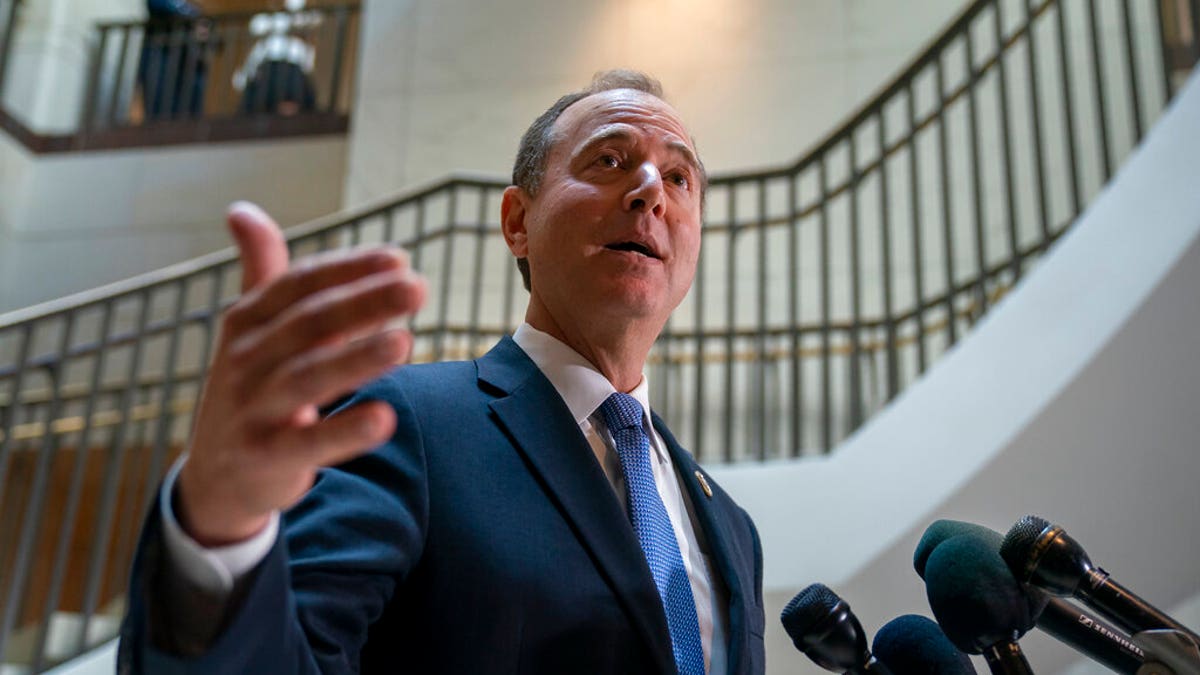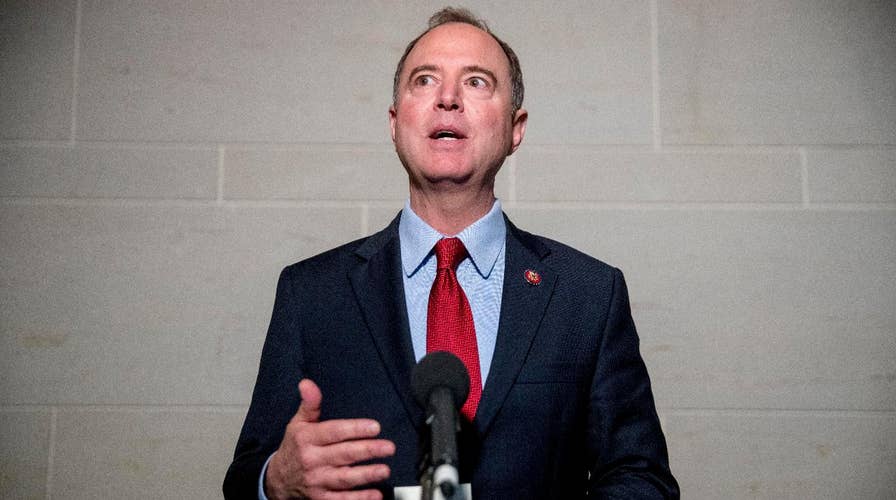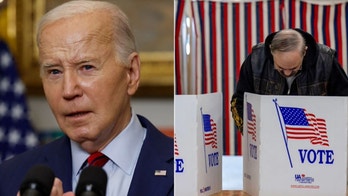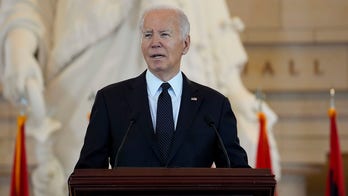Democrats to subpoena Amb. Sondland after State Department blocks diplomat's testimony
Trump administration orders U.S. ambassador at the center of Ukraine scandal not to appear for deposition; reaction from Matt Schlapp, president of the American Conservative Union, and Michael Meehan, former chief of staff for Washington Senator Maria Cantwell.
Two weeks after Rep. Rashida Tlaib, D-Mich., mused about arresting administration officials to force compliance with subpoenas related to the impeachment inquiry into President Trump, House Democrats are faced with a test of their resolve on that issue as a flurry of deadlines likely to be ignored comes up this week.
At an event on Oct. 1, Tlaib said House Democrats were discussing how to hold administration officials in contempt of Congress for ignoring subpoenas in a video recorded by a member of an anti-Democrat political action committee, the Washington Free Beacon reported.
"So they're trying to figure out, no joke, is it the D.C. police that goes and gets them?" Tlaib said. "We don't know. Where do we hold them?"

Rep. Adam Schiff, D-Calif., chairman of the House Intelligence Committee, speaks with reporters about a whistleblower complaint Thursday, Sept. 19, 2019, on Capitol Hill. Members of the Trump Administration and multiple others have indicated they will ignore subpoenas related to impeachment issued by Schiff's committee and others in relation to the impeachment probe into Trump. (Associated Press)
BOLTON INSTRUCTED FORMER RUSSIA ADVISER TO ALERT NSC LAWYER OVER UKRAINE, ADVISER TESTIFIES
Several subpoenas of Trump administration officials or associates requesting documents related to Trump's actions on Ukraine, which are the central basis for the impeachment inquiry announced by House Speaker Nancy Pelosi, D-Calif., on Sept. 24, have deadlines this week.
Trump withheld $400 million worth of military aid to Ukraine shortly before a July 25 phone call with Ukranian President Voldomyr Zelenskyy on which he asked his counterpart to investigate 2020 rival Joe Biden's son, Hunter, and his involvement with Burisma Holdings, a Ukrainian gas company. Burisma was under investigation while the younger Biden was on the board. The investigation was dormant in 2016 when Joe Biden, as Vice President, pressured Ukraine to fire the prosecutor who was in charge of the Burisma probe, citing alleged corruption.
The White House, however, has said that it will not comply with impeachment-related subpoenas, calling the inquiry "invalid" because the full House never voted to authorize proceedings. Though previous impeachment efforts have begun with a vote of the full house, there is no requirement in the Constitution for such a vote.
So they're trying to figure out, no joke, is it the D.C. police that goes and gets them? We don't know. Where do we hold them?
GIULIANI 'DISSAPOINTED' IN BOLTON AMID CLAIM HE TOLD AIDE TO ALERT LAWYER TO UKRAINE PROBE
"In the history of our Nation, the House of Representatives has never attempted to launch an impeachment inquiry against the President without a majority of the House taking political accountability for that decision by voting to authorize such a dramatic constitutional step," the letter, written by White House Counsel Pat Cipollone, read.
The House Intelligence, Oversight and Foreign Affairs committees set a Monday deadline for Gordan Sondland, U.S. ambassador to the European Union, to turn over Ukraine-related documents. He said he would testify before the committee on Thursday -- after the State Department previously blocked him from appearing for questioning -- but that he would not turn over documents, according to Roll Call, because that decision was up to the State Department.
Tuesday brings four more significant deadlines for documents. House committees subpoenaed the Department of Defense, the Office of Management and Budget, Vice President Pence and Trump's lawyer Rudy Giuliani. None of these subpoenas are expected to be complied with.
The OMB is being subpoenaed because it played a role in freezing the aid to Ukraine, as is the DOD. Lawmakers are interested in Giuliani because of his central role in Trump's Ukraine efforts, as well as the fact he was mentioned multiple times in the transcript of Trump's July 25 call with Zelenskyy. Pence is being subpoenaed because of reports a member of his staff listened in on the call.
GAETZ SPEAKS OUT AFTER SCHIFF THROWS HIM OUT OF IMPEACHMENT INQUIRY HEARING
Lev Parnas and Igor Fruman, two Giuliani associates who were arrested last week on charges of funneling foreign money into U.S. elections, are being asked to turn over documents related to Giuliani's efforts to get Ukraine to investigate the Bidens by Wednesday.
Parnas and Fruman said they "agree with and adopt the position of the White House Counsel" and would not comply with the impeachment inquiry. That position is shaky, however, because the men are not government officials.
Finally, the House committees are requiring Department of Energy Secretary Rick Perry and White House Chief of Staff Mick Mulvaney to hand over Ukraine-related papers by Friday.
Perry has not made an explicit statement on his subpoena, but as a member of the executive branch, it is possible he will also refuse to turn over documents. Lawmakers are roping Perry into the impeachment inquiry after Trump said Perry told him to make the July 25 call.
FEDERAL PROSECUTORS SCRUTINIZE GIULIANI'S BUSINESS DEALINGS
The House voted in July to ask the Justice Department to prosecute both Secretary of Commerce Wilbur Ross and Attorney General William Barr for criminal contempt of Congress after stonewalling investigators on the decision-making that went into the now-abandoned effort to put a citizenship question on the 2020 census.
Contempt of Congress is most commonly alleged when an individual is refusing to appear before a committee to answer questions under Congress' "power of inquiry." The Congressional Research Service lists three types of contempt which Congress has at its disposal: civil, criminal and inherent contempt.
More commonly used than inherent contempt, civil contempt relies on courts for enforcement while criminal contempt relies on prosecution by the executive branch.
CLICK HERE TO GET THE FOX NEWS APP
Inherent contempt, which Tlaib was apparently referring to, hasn't been used by Congress since the 1930s. Under this process, either the House or the Senate can authorize an arrest warrant and order the Sergent-at-Arms to bring the individual being held in contempt before the chamber. If the person is ruled guilty of contempt after a hearing in that chamber, lawmakers can then imprison that person until he or she complies with Congress' request.





